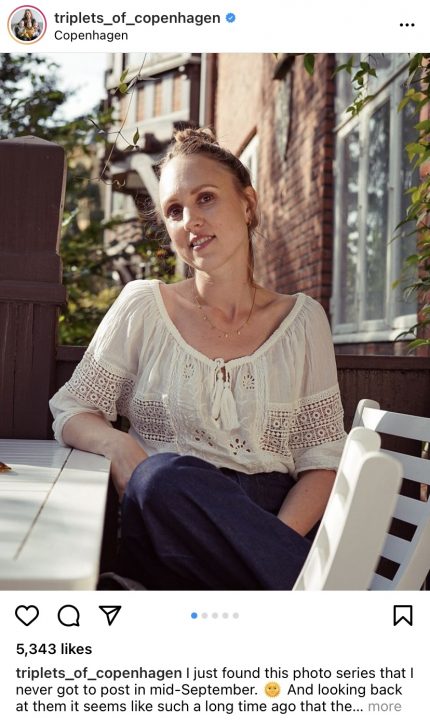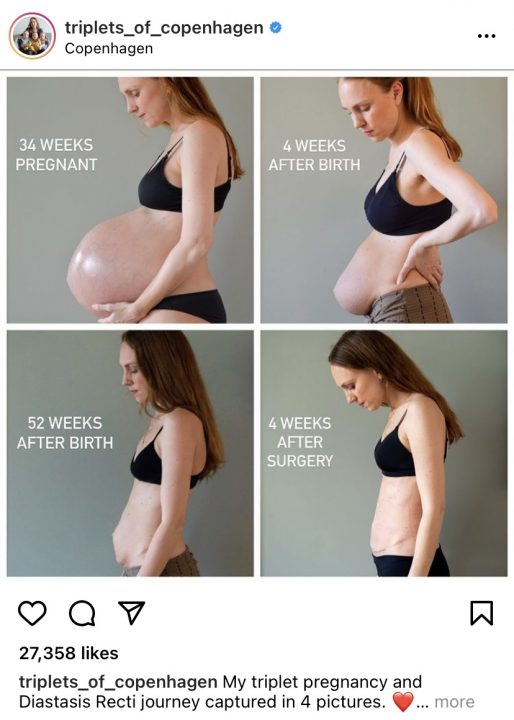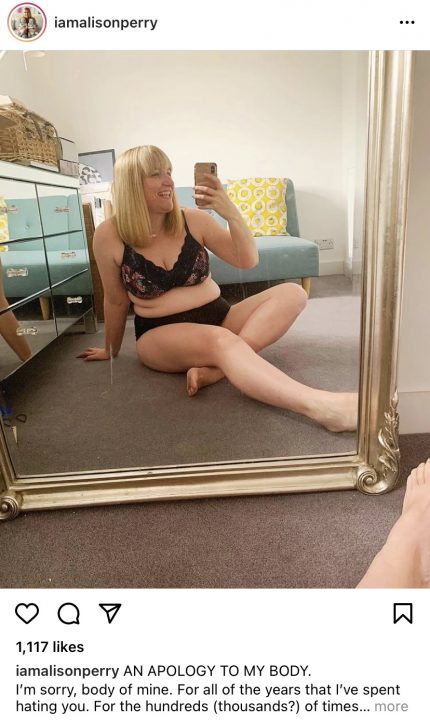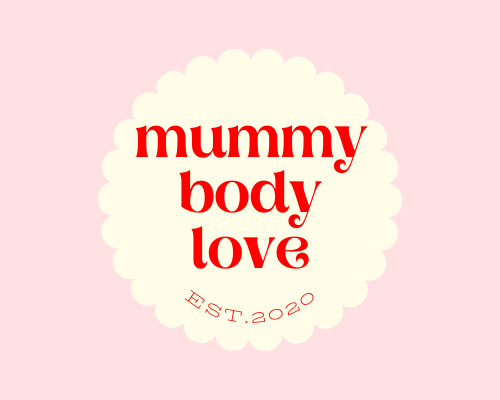Emily Weatherill speaks to mums who’ve had a belly full of Instagram, and are ready to show the world the reality of a mum-tum.
Instagram has become a breeding ground for comparison and self-deprecation. Our feeds are filled with influencers who we have set as the cornerstone for beauty standards.
A study by Florida House Experience, a healthcare institution, found that 87% of women compare their own bodies to images that they see on social media.
Scrolling through social media, you’ll be hard done by to find pictures of mum-tums, or anyone flaunting their natural body after birth. We’ve come to associate beauty with a slim, slender, and toned body shape. This has caused many mothers to become obsessed with ‘snapping-back’ to their pre-baby body.
The mental impact
Maria Jørstad (@triplets_of_copengahen) is an influencer with aims to be the fighting voice for change, among a sea of six packs.
“It’s natural, women giving birth, it’s happened forever. So it’s so crazy that it’s become a status to say ‘oh look I have abs again’. I wanted to be honest about it. It’s not like that.”

On average, women gain between 10-15 kilograms during pregnancy. Most of this weight will drop off naturally after birth, but one in four women will stay around five kilograms above their previous weight.
Jo Hunt, mother of two, told me how she felt like a failure when she saw mothers who had ‘snapped back’ to shape and were sharing pictures of their six packs. She remembered how the comments were flooded with compliments and praise. “You start to think that those women are better, and that they are the definition of attractive. Then you feel guilty for not working out enough.”
They didn’t even show their bellies to their husbands or partners because they were ashamed
Exercise wasn’t even an option for Maria who, after carrying her triplets for over 35 weeks, was diagnosed with a severe case of Diastasis Recti. The condition causes your abdominal muscles to separate. Leaving your organs unprotected and causing serious back pain.
After a yearlong recovery, Maria eventually had to have surgery to repair the muscles and remove the excess skin. She explained how the excess skin made her look pregnant and caused her mental health to spiral as she constantly compared herself to how she looked before.

Time for honesty
Instead of editing out the bad side, Maria shared each day of her recovery on social media. She told me how many women had written to her thanking her for sharing her truth about her struggle over accepting her body because they felt abnormal for feeling the way they did.
“They were embarrassed or depressed and didn’t even show their bellies to their husbands or partners or anyone because they were ashamed.”
We have started to view our bodies as a defining characteristic of who we are. Changes to our physical appearance puts us off balance, we can’t identify with our self anymore, and this can be an emotionally challenging experience.
Holli Rubin is a psychotherapist specialising in body image issues and works to help women overcome these challenges to allow themselves to live a full life. Alongside being a mother to three, she has spent years researching the relationship women have with their body after birth and found that identity plays a key role in the issue.
“The desire to get back their pre-pregnancy body is very common as a way of holding onto who they were. Identity comes into question and who they are as mothers is still foreign and not yet established.”
Change for the better
If you’re feeling insecure about something, you’re unlikely to share it across the internet. So, when your social media feed is full of images of women toned to perfection, it seems obvious that we would associate confidence with this body type.
Holli recommends to her clients that they make a change to who they follow as this can improve their mindset. If we start following more women who share their mum-tums and their natural changes, maybe we’ll start believing that every body can be an ‘insta-body’.
One woman you can hit that follow button for is Alison Perry (@iamalisonperry), an influencer on a mission to embrace every curve of her body and one that isn’t afraid to share it online.

“I’m a size 18 and I’m fine to dance around in my bra and pants and show you that I’m okay with that, and hopefully it might make someone look differently at their own body.”
Body confidence hasn’t always been easy for Alison: “I spent so much of my time going to Weight Watchers classes and going to bed hungry because I thought that was the only way I could lose weight, and the only way I could be happy was to lose weight. And that was completely utter utter rubbish.
“Since then, I’ve just been on this journey to make friends with my body and be okay with my body and that’s a journey that I’m still on.”
Being toned to perfection doesn’t mean you have a successful body
Alison is working to make sure her daughters grow to have a healthy relationship with their body. She never stands in front of the mirror criticising the way she looks whilst her children are around. “I have to put so much effort into being positive about my body in front of my daughters so that hopefully they will grow up and think positively about themselves.”
It’s so ingrained into our culture that ‘skinny is good’, we are now having to force ourselves to believe that a body that has grown a child can be beautiful too. Well, it is! We need to learn to be more self-compassionate.
Being toned to perfection doesn’t mean you have a successful body, and it certainly isn’t the definition of beauty.
Social media can be a place of love, support and kindness if we let it. Find people with lives you can relate to, and mindsets that make you feel good. Challenge the regimented body type of influencers by following a wider range of body types.
For women who want to join a social media community that not only makes them feel good, but also allows them to support other women too, follow us over on Instagram @mummybodylove.
To see more from the project click the links below:


 Mum-Tums are Insta-Bodies too – Video
Mum-Tums are Insta-Bodies too – Video